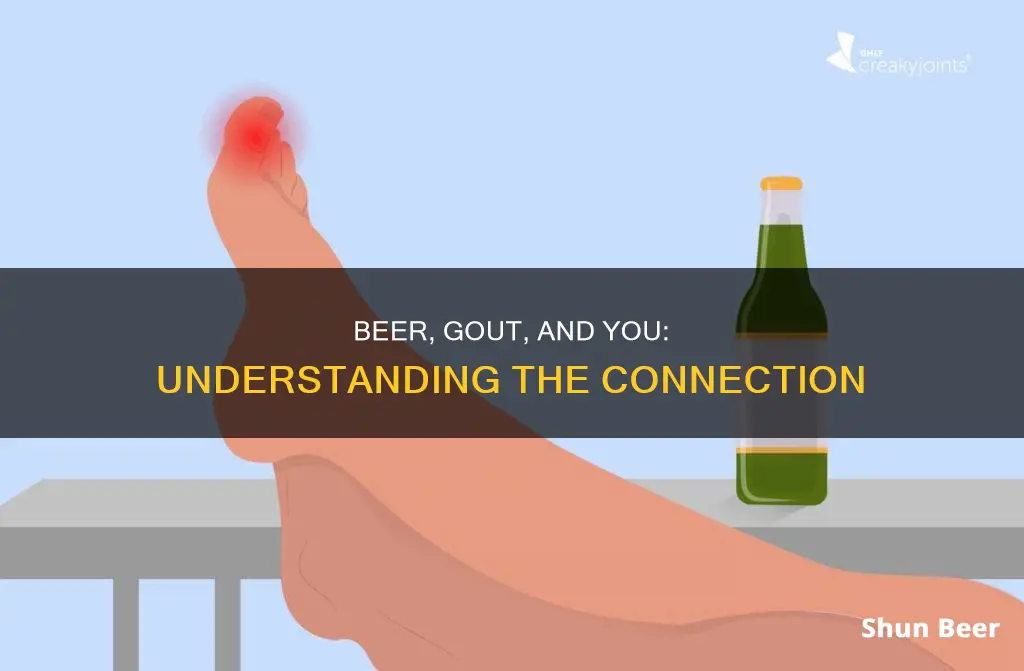
Gout is a type of inflammatory arthritis caused by excess uric acid in the body. While the condition is often associated with overindulgence and drinking too much alcohol, it is a serious condition that can be extremely painful. Beer, in particular, has been found to lead to gout symptoms due to its high purine content, which the body breaks down into uric acid. Other alcoholic beverages such as spirits have also been linked to gout. However, it is important to note that gout is not solely caused by alcohol consumption and there are other risk factors and triggers involved.
| Characteristics | Values |
|---|---|
| Can excessive beer drinking cause gout? | Yes |
| Type of arthritis | Inflammatory |
| Excess substance in the body | Uric acid |
| Crystals form in | Joints |
| Most common location for crystal formation | Big toe joint |
| Other locations for crystal formation | Fingers, wrists, knees, ankles |
| Alcohol's effect on the body | Increases the level of uric acid in the bloodstream |
| Beer's purine content | High |
| Beer's effect on gout | Worsens gout symptoms |
| Beer's effect on urate levels | Increases them by two to five times |
What You'll Learn
- Beer is high in purines, which are converted into uric acid by the body
- Excessive alcohol consumption affects the kidneys, causing them to excrete alcohol instead of uric acid
- Beer is the greatest culprit of alcoholic drinks when it comes to gout, with spirits and wine following behind
- Gout is a type of inflammatory arthritis caused by the deposition of monosodium urate crystals in the joints
- Gout is more common in men than in women, and it rarely affects women before menopause

Beer is high in purines, which are converted into uric acid by the body
Beer is high in purines, which are organic compounds that the body breaks down and converts to uric acid. Purines are found in high-protein foods and some drinks. Gout is a type of inflammatory arthritis that develops in response to hyperuricemia, which is the medical term for excess uric acid in the blood. Beer is rich in purines, so consuming it may worsen gout.
Gout is caused by the crystallization of uric acid in the joints, which triggers an inflammatory response that may lead to joint pain, swelling, and issues with mobility. The excess uric acid can also form crystals in the kidneys, causing kidney stones, or build up in various places in the body, such as below the skin, resulting in "bumps" called tophi.
People with gout should avoid or limit their consumption of alcoholic beverages, including beer, wine, and spirits, as these can trigger gout symptoms and increase the risk of gout flares. Beer, in particular, has been found to have the most purines among alcoholic drinks and has a strong association with gout attacks. One study showed that men who drank one serving of beer daily were 50% more likely to have gout, while those who drank two or more servings were 2.5 times more likely.
In addition to alcohol, other risk factors for gout include a diet high in purine-rich foods, such as red meat, certain fish, and high-fructose corn syrup; a family history of gout; and certain chronic conditions, such as heart disease, kidney disease, and diabetes.
Beer and Crohn's: What's Safe to Drink?
You may want to see also

Excessive alcohol consumption affects the kidneys, causing them to excrete alcohol instead of uric acid
Gout is caused by the crystallization of uric acid in the joints, which triggers an inflammatory response that may lead to joint pain, swelling, and issues with mobility. The excess uric acid in the blood can also form crystals in the kidneys, causing kidney stones. People with gout are at risk for serious comorbidities, including heart disease and diabetes.
The link between alcohol consumption and gout has been well-established by numerous studies. A 2021 review found that most studies linked gout to the consumption of alcoholic beverages, such as beer and spirits. Another study found that men who drank one serving of beer daily were 50% more likely to have gout, while those who drank two or more servings were 2.5 times more likely.
Beer is particularly high in purines, which are organic compounds that the body breaks down and converts to uric acid. Other alcoholic beverages, such as wine and hard liquor, can also trigger gout symptoms in people who are prone to the disease.
It is important to note that gout is a genetic disease, and dietary factors alone are not enough to cause it. However, for individuals with gout, limiting alcohol intake, especially during the first six months after starting uric acid-lowering medication, is crucial for managing the condition.
Oral Sex, Beer, and Yeast Infections: What's the Link?
You may want to see also

Beer is the greatest culprit of alcoholic drinks when it comes to gout, with spirits and wine following behind
Gout is a type of inflammatory arthritis caused by the buildup of uric acid in the body. This buildup can lead to the formation of small, sharp crystals that settle in the joints, causing pain and swelling. While the condition is often associated with dietary factors, it is primarily genetic. However, certain foods and drinks, such as those high in purines, can increase the risk of gout by raising uric acid levels in the body.
Among alcoholic beverages, beer is particularly high in purines, specifically a type called guanosine. A 2019 study found that beer had the highest levels of purines among alcoholic drinks. As a result, beer has been consistently linked to an increased risk of gout. One study found that men who drank one serving of beer daily were 50% more likely to develop gout, while those who drank two or more servings were 2.5 times more likely. Another study showed that drinking two or more beers daily doubled the risk of gout compared to non-beer drinkers.
While beer is the most significant contributor to gout among alcoholic drinks, other types of alcohol can also trigger symptoms. Spirits, such as hard liquor, have also been associated with an increased risk of gout. One study found that consuming two shots of spirits daily increased the risk of gout by 1.6 times compared to non-drinkers. Wine has been shown to have a milder effect, with some studies suggesting a potential protective effect due to its antioxidant and phytoestrogen content. However, other research has found a link between wine consumption and gout risk.
In summary, while beer is the greatest culprit among alcoholic drinks when it comes to gout, with spirits also contributing, wine appears to have a less significant impact. However, it is important to note that the risk of gout is influenced by various factors, including diet, genetics, and overall health. Individuals concerned about their gout risk should consult with their doctor for personalized advice.
Invisalign and Beer: What You Need to Know
You may want to see also

Gout is a type of inflammatory arthritis caused by the deposition of monosodium urate crystals in the joints
The deposition of monosodium urate crystals in the joints is a result of hyperuricemia, which is the medical term for excess uric acid in the blood. Hyperuricemia occurs when the body is unable to effectively eliminate uric acid, leading to increased levels in the bloodstream. Uric acid is produced when the body breaks down purines, which are organic compounds found in certain foods and beverages.
Beer and other alcoholic drinks are high in purines, and their consumption can lead to increased uric acid levels. Therefore, excessive beer drinking can contribute to the development of gout by increasing uric acid levels in the body. The link between alcohol consumption and gout has been supported by various studies. A 2021 review found that most studies linked gout to the consumption of alcoholic beverages, especially beer and spirits. Additionally, a 2014 study found that consuming one to two alcoholic beverages per day significantly increased the risk of developing gout compared to not drinking any alcohol in a 24-hour period.
The impact of beer consumption on gout may vary depending on the type of beer and the amount consumed. Beer contains a type of purine called guanosine, which can increase uric acid levels when broken down by the body. The more beer a person consumes, the higher their risk of developing gout becomes.
It is important to note that gout is not solely caused by alcohol consumption. Other risk factors include a family history of gout, a diet high in purine-rich foods, certain chronic conditions such as heart disease and kidney disease, and specific medications. However, excessive beer drinking can be a contributing factor to the development of gout by increasing uric acid levels and triggering the deposition of monosodium urate crystals in the joints.
Beer and Bowel: Friend or Foe?
You may want to see also

Gout is more common in men than in women, and it rarely affects women before menopause
Men outnumber women in all age groups for prevalent gout, with the ratio varying from 5:1 to 10:1 in younger age groups. However, the gender difference in disease incidence decreases in the postmenopausal years.
Several studies have found that women with gout tend to be older than men with gout and have a higher prevalence of comorbidities, such as hypertension, dyslipidemia, coronary heart disease, diabetes mellitus, peripheral arterial disease, renal insufficiency, and renal failure. Women with gout also tend to use diuretics more often than men.
In terms of treatment, women with gout are less likely to receive allopurinol and less likely to get joint aspirations for crystal analyses to establish a diagnosis. However, they are more likely to receive serum urate monitoring within six months of initiating urate-lowering therapy.
The reasons for these differences in gout prevalence and treatment between men and women are not entirely clear. Further research is needed to understand the underlying mechanisms and to develop effective prevention and treatment strategies for both men and women.
Drinking Beer While on Norvasc: What You Need to Know
You may want to see also







